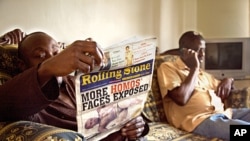Two U.S.-based filmmakers have made a riveting documentary looking into the struggles and activism of Uganda's embattled gay community.
The film is called Call Me Kuchu. Kuchu is the name used in Uganda to describe members of the lesbian, gay, bisexual and transgender community.
The film's trailer gives voices to some of them, like Stosh. "People want to know our stories. That is one reason I decided to come out, no matter what," said Stosh.
Filmmaker Malika Zouhali-Worrall said she noticed most outside media coverage seemed to focus on the victimization of gays in Uganda, while she wanted to show a more complex reality.
"Main stories that were getting out there and being reported on were stories of persecution to the LGBT community, all of which was of course happening and it was very important that that got out there," said Zouhali-Worrall. "But it seemed that no one was actually aware that there was this activist community there that was actually working very hard to change the situation and in some cases actually succeeding in making steps toward changing the situation there."
Watch the movie trailer:
Call Me Kuchu - Trailer from Call Me Kuchu on Vimeo.
One victory last year came when a judge in Uganda ruled a tabloid newspaper violated the civil rights of gays whose pictures were published accompanied with the words "Hang Them."
The film's other director Katherine Fairfax Wright says Uganda is losing a lot by marginalizing its vibrant gay community.
"By and large this is a demographic that is highly educated, highly organized, highly energetic and really hard working. But they are not able to hold jobs, they are kicked out of their homes, they are just not able to be the active members of society as they would like to be," said Wright.
One of the film's main protagonists is David Kato, a gay rights campaigner, who died after being brutally attacked in his home in Mukono outside the capital Kampala in January 2011.
He had been one of those whose picture was published in the tabloid. His murder took place shortly after the court ruling.
The filmmakers rushed back to attend his funeral and included tributes in the film.
Last year, Sidney Nsubuga Enoch, who was described by police as a well-known local thief, was found guilty of the murder and sentenced to 30 years in prison, but some activists called the trial a cover-up.
In January of this year, activists came together to mark the first anniversary of Kato's killing.
One of those who spoke in his honor was elder clergyman and human rights activist Christopher Senyonjo.
"He was ready to sacrifice himself in order to bring about change, change and justice for the oppressed," said Senyonjo.
Filmmaker Zouhali-Worrall says the film, which is also now a tribute to Kato's last year of life, tries to portray him as the ordinary man he also was.
"David especially is someone who has been both demonized and kind of mythologized depending on who you speak with in Uganda," said Zouhali-Worrall. "We were keen to show him as we knew him, which was a very normal person dealing with very extraordinary circumstances and as a result, having an incredible amount of courage to do what he did. But we feel it is very important that people understand that he was a normal person like you or I, basically fighting for human rights."
She says the movie has added significance now, as a controversial anti-homosexuality bill has been reintroduced for consideration in Uganda's parliament.
Proponents of the bill say it no longer includes the proposed death penalty and life sentence provisions for homosexual acts as it did when it was first proposed in 2009, but that it does strengthen laws to reduce homosexuality.
Homosexuality is already illegal in Uganda, where U.S. evangelical and conservative political leaders have also worked in helping anti-gay efforts.
The film Call Me Kuchu was well received by critics and audiences and won two awards as it made its debut on the international film festival circuit earlier this year in Berlin, Germany.




